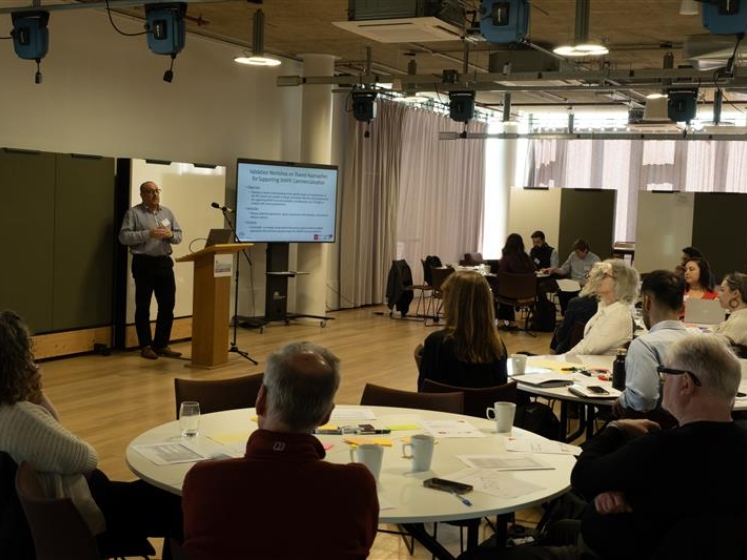Jump to:
Our project
"Creating the evidence base for shared TTO need in SHAPE spinouts" ran between November 2024 and April 2025, as a collaborative project led by LSE, in partnerships with the Universities of Bristol, Lancaster and Leicester and the Royal College of Art. The project is also being supported by global innovation consultancy, Oxentia. It will provide a new understanding of the value proposition for shared technology transfer office (TTO) models in SHAPE commercialisation, with the aim of optimising the outcomes of any future investments of time and resource into shared approaches.
This work addresses a significant gap in policy, sector and funder understanding of the needs, both of smaller institutions with SHAPE-based innovation activity, and of the willingness and ability of larger institutions to meaningfully and effectively share TTO functions to mutual benefit.
We are using a combination of literature review, surveys, interviews and focus groups to produce a detailed picture of:
- What SHAPE spinout support currently looks like in different universities.
- Where universities feel they have significant capacity and capability gaps or could support the biggest gains.
- How much and what sorts of resource larger (or better resourced) institutions might be willing to share to support spinout activity in smaller universities.
- The most significant challenges and benefits that institutions of all types perceive in sharing TTO functions and the key factors for consideration when assessing possible TTO solutions.
- Which model(s) of sharing a range of TTO functions are deemed feasible, viable and desirable, and what conditions would need to be met to start implementing one or more of these models.
- Whether universities would prefer to share capacity at regional level, by specialism, or in line with some other shared characteristic(s).
Project Report
This project was developed in response to a Research England call for applications to a scheme piloting shared technology transfer functions in universities in England.
The project sought to establish an understanding of the value proposition for shared TTO models in SHAPE commercialisation. The project had four key objectives. First, it aimed to engage a wide range of UK HEPs to deepen and formalise understanding of SHAPE commercialisation needs. Second, it sought to establish a robust evidence base relating to current practices, highlighting needs among HEPs supporting SHAPE spinouts. Third, the project would evaluate the merits of different “sharing models” for TTO functions. Lastly, it would offer evidence-based recommendations for strengthening SHAPE commercialisation, with a focus on England and relevant insights for devolved nations.
The report offers a summary overview and some initial reflections and recommendations against these four main areas. Whilst the review gathered robust data about the current state of SHAPE commercialisation and needs of the sector, we did not find evidence for one single model for sharing. As a result, we present these more as prompts for further discussion and suggestions as to potentially fruitful next steps, rather than as concrete recommendations.
Literature review
Our Literature Review provides a summary overview of a range of current and previous UK and international approaches to sharing support for technology transfer, particularly in SHAPE disciplines. Although none of these emerges as a ‘silver bullet’ to optimise SHAPE support, the review makes clear both that shared approaches have been long and widely considered desirable, and that some are more (and less) effective than others.
Consultation results
Our survey was open from 12 December to 22 January 2025. Download the survey results analysis.
Devolved nations focus groups were held in February 2025. Download the focus groups analysis.
We conducted 40 interviews with UK Higher Education Providers. Download the full analysis and headline takeaways.
Validation Workshop
 CCF Workshop 29 April 2025
CCF Workshop 29 April 2025
On 29 April 2025, the project team hosted a successful workshop at the Royal College of Art with commercialisation and innovation practitioners from a range of higher education institutions.
The day began with an introduction to the project and a presentation of the findings from the survey, interviews and focus groups included in the report.
Following this, three workshop sessions enabled attendees to discuss their own institutional needs regarding SHAPE commercialisation and collaborate on potential next steps with others who shared similar priorities. These interactive sessions involved:
- Introduction to Shared Approaches: Participants were introduced to different approaches for SHAPE commercialisation and engaged in discussions to share initial thoughts. They selected their preferred approach to focus on after the coffee break.
- Developing Shared Support: Groups ideated on the components needed for each approach, sorted them into clusters, and discussed their importance and applicability.
- Delivering Shared Support: Teams worked on top priority ideas from the previous session, creating models for delivering support under varying resource scenarios.
The event concluded with a wrap-up session summarising the day's discussions and outlining next steps, namely forming groups to further develop ideas and aligning them with ongoing activities. We extend our heartfelt thanks to all participants for their contributions and patience on the day.
View Workshop Photos
Our partners
Our Operations Group for this project comprises:
We are supported at Oxentia by:
Our Steering Group is made up of:
Find out more
Anyone interested in learning more about this project should contact Josef Walker, (josef.walker@leicester.ac.uk) or Dr Jen Fensome (j.fensome@lse.ac.uk).